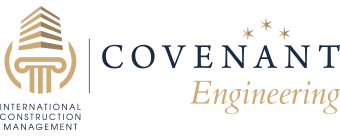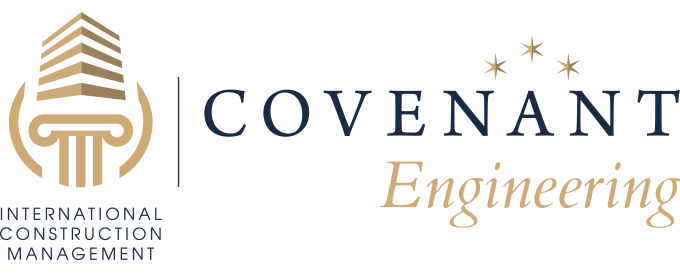2. Project Management

Covenant Engineering GmbH will act as your agent to monitor and manage your building project. Our wide range of services includes expert advice on hiring specialist engineers and defining the scope of their contracts as well as the coordination of individual specialist teams during the on-going planning process and keeping an eye on keeping the progress of construction on schedule during the actual construction phase. In addition, we monitor the tendering and contract processes and keep a constant check on costs throughout the project. Finally, our project management services extend to handling post-handover warranty and repair issues.
2.1 Advice on the use of specialist engineers
In a construction project, it can often be necessary to call upon the services of different specialists. During the planning phase, our experienced engineers and architects will be able to tell whether a specialist will have to be consulted or if the services required might be obtained from engineers already involved in the project. Accordingly, we not only support you in selecting the right specialist for your needs, but also create a precise and detailed description of what your project requires of them. This is necessary and important, since such a specification allows a precise set of deliverables to be defined and serves as a basis for the engineers’ cost estimates and billing. An exact specification therefore not only ensures faster and more effective planning, but can also save the client money, too.
2.2 Reviewing contract documents
Our services also extend to reviewing the terms of the contracts you will sign with the various trades. These should be checked by us before you sign them in order to save hassle and anger. It is especially important to check the proposed deadlines because these can significantly shorten the planning phase of your project. Other key points in the contract include payment terms, surety bonds, and, of course, file formats and the number of paper copies to be provided. Specifying these details with precision in the contract ensures a hassle-free planning process and saves time, nerves and money.
2.3 Calculation of fees
The fees for architects and engineers are defined on the basis of billable costs and include the costs for a specific planning task. We calculate these key figures for your project in advance so that you know what to expect in terms of fees from the specialists you hire.
2.4 Coordinating and managing the planning processes
To keep your construction planning smooth and efficient, project management and coordinating the planners and engineers is crucial. This is why we not only initiate regular planning meetings for planners and engineers to communicate with each other effectively, but also advise you on the use of virtual and web-based planning services. These allow everyone involved to share and publish their plans online. This ensures that every planner and architect is always working with the most current plans and helps prevent double planning. The larger your building project and the more planners and architects involved, the more impact the creation of such a virtual project space will have on your project’s efficiency.
Even at regularly scheduled planning meetings held in person, we handle the coordination and recordkeeping so that you can keep a constant track on current developments and so we can monitor progress on the work agreed in the planning sessions.
2.5 Controlling the planning and tendering process for your project
2.5.1 Reviewing technical and financial options
First, we review the design of your building project for its actual feasibility. We use our practical and theoretical experience and perform an intensive examination of all the plans. We also review, of course, whether all of the building parts and components in the plans can actually be built on site or if it would be better and more affordable to use pre-fabricated parts. Pre-fabricated parts often deliver better quality through more controlled production environments and can shorten the construction timeframe because they are relatively simple to install on site. An important part of project management therefore includes increasing the efficiency of the construction phase.
2.5.2 Selecting the right products
In many cases, the names of individual products are used to name a whole class of products. During planning and the preparation of specifications, however, better-known products often get specified at a higher cost, even though they offer no distinguishing advantage over lower-cost alternatives. This is why we always choose for you those products that offer the highest benefit for the cost. This can significantly minimize construction costs and this forms a regular part of our project controls.
2.6 Effective deadline controls
A realistic and efficient schedule is a key factor in every building project and we consider it a part of the project controls we perform. From the first project meeting, a precise schedule needs to be established to include the timeframes for all of the work and planning stages of the project. This schedules is then used to determine the continued flow of the construction project and the plan is then further refined for each stage of planning and construction. In the process, on-going monitoring of the steps already completed based on the schedule is important and necessary.
During the planning phase, the rough schedule previously outlined will be fleshed out in detail with milestones that will provide a realistic basis for your liquidity planning. Thanks to our regular review of the schedule and individual phases of the construction, we are able to recognize any delays in advance and counter them quickly and effectively. This effectively keeps construction on schedule and construction costs on budget.
2.6.1 Monitoring deadlines during the construction phase
During the actual construction phase, regular monitoring of deadlines and individual contractors is essential. During the planning phase, only a few stakeholders are involved, but during the construction phase, the number of individual contacts to manage increases enormously. As on-site construction managers, we coordinate this communication and handle project and deadline controls for all of the contractors. We use our experience and competence to keep everyone cooperating and on schedule.
2.6.2 Monitoring deadlines during the planning phase
During the planning phase, the rough schedule previously outlined will be fleshed out in detail with milestones that will provide a realistic basis for your liquidity planning. Thanks to our regular review of the schedule and individual phases of the construction, we are able to recognize any delays in advance and counter them quickly and effectively. This effectively keeps construction on schedule and construction costs on budget.
2.7 Cost controls throughout
At every phase of your construction project, controlling the costs is essential and not to be underestimated. An on-going review of all cost factors and comparing everything that needs to be done with your budget allows us to monitor all on-going and incidental costs completely and in detail.
2.7.1 Cost controls in the planning phase as part of project controls
Even before the actual planning for your construction project gets started, we’re at work managing your project controlling your costs. We give you realistic advice as to whether your requirements for the building project are feasible with your budget. If any difficulties arise, we will, of course, show you alternatives that would still make your construction project successful, whether it’s an alternative construction method or the selection of alternative building materials, restricting a building function or an overall reduction of the construction project.
The more we work on the plans and more details emerge, the more precisely we will able to define and describe the services required and, of course, put a price on them. For this reason, an on-going review of the costs to be expected based on the current plans and correlating these costs with the existing project budget is extremely important. This will also any issues that arise to be detected early on and then eliminated through targeted cost management.
2.7.2 Controlling costs in the tender stage
During the tendering of bids for individual contracts, the costs of the construction project can be reduced significantly. Selecting the right contractors and, of course, defining precisely what services they are to provide allows costs to be minimized without compromising the quality of the construction project. Being clever in dividing what services are rendered by which contractors can also save money. However, in order to keep a handle on all of the services and their costs, on-going controls are required as is a good deal of experience in this critical aspect of construction. As experienced project managers, we, of course, have this experience in large industrial and commercial projects as well as in the construction of single-family homes.
2.7.3 Controlling costs during construction
During the actual construction phase, two factors can affect the cost of the project. The first is when the client makes addition to the wish list which often leads to an increase in costs that should not be underestimated. But other unforeseen problems in the construction process itself can also jack up costs. As project managers, we perform continuous cost controls to compare actual costs with those budgeted so that we are always able to project the likely final cost of the project for you.
2.8 Potential for savings in the tendering process
The tendering process is usually the last opportunity to influence the costs of a construction project. By being careful in selecting among the bidders, the costs can still be tweaked later on.
2.8.1 Selecting bids
A project can be implemented effectively only if the right contractors are selected. Thanks to our many years of experience and our good network of contacts in the industry, we can draw on a large pool of companies that offer both excellent quality and high efficiency.
2.8.2 Reviewing and checking bids received
To give you a better overview of the bids received and help you make the right selection of contractors, we create side-by-side comparisons of the bids for each trade.
We do, however, also check each bid carefully, because many bidders will set their prices too high or too low due to imprecise specifications in the tender. Helping clarify these details for the bidders can often correct these errors and lead to a better, more realistic bid.
In addition, we use our experience to sniff out those bids that are purely speculative where the bidder adjusts the services or quantities in order to give you what appears to be a better price. The bidder then uses this to overcharge for later change requests, something that we can avoid thanks to our experience. Our side-by-side comparison also helps sniff out any price collusion among the bidders because the prices for the same services can be readily compared.
2.8.3 Bidder negotiations
Negotiations with the bidders require a high level of experience and industry knowledge. These discussions are not just about meeting the companies and the people involved, but also discussions of the services being offered. Any ambiguities need to be eliminated and the nature and scope of the work precisely defined. Since bidders are paid on a lump-sum basis, it is particularly important that all of the documents and specifications are available for the negotiations, because this is the only way the bidder is capable of making a well-grounded bid proposal. All of the documents required for this purpose then form the basis for the subsequent construction contract. That’s why providing these documents needs to be recorded accurately, an important point that our engineers and architects always ensure as experienced project managers.
2.8.4 Reviewing and drafting contracts
As experienced construction managers, we can provide you with a variety of standard contracts that have been reviewed by attorneys, although it is especially important to adapt the contract to the particular conditions of the project. Depending on the scope of the construction project, it is best to have all contracts reviewed by your attorney to protect yourself as the client. In every contract you sign, there are general but important points that need to be clearly defined in detail. These include establishing who has the right to speak on your behalf as your representative, the validity of general terms and conditions, deadlines, inclusion of additional contract terms for the trades, payment terms, determining who will pay for construction equipment, insurance, waste disposal, warranties, contractual penalties and sureties in the form of bonds. However, the most important point in such a contract is the description of the services to be provided. This must be defined in the form of specifications presented in detail in the plans to be effectively protected against being charged later for additional services. It may be helpful to document the current state of planning at the time the contract is drafted and include it in the contract.
Only this kind of iron-clad contract can simply and effectively block later attempts by contractors to bill more than agreed. It is important to take into account Part C of the General Regulations for Bids and Contracts in the Construction Industry (VOB). Ideally, our preliminary technical remarks should also be included in the contract, because they will list the services in several areas as ancillary.
2.9 Quality assurance during the construction and planning phases
As experienced project managers, we will, of course, check all of the materials used in your project and document them in the materials catalog we create for you. We will pay particular attention to your requirements for the materials and will, of course, provide information about the health aspects of the individual materials upon request. In this step, we will, of course, check every angle, measurement and surface and ensure that the tolerances listed in the specifications have been met.
2.9.1 Reviewing quality and quantities
Our constant monitoring of the construction based on the building plans and the specifications serves two purposes. First, we will check whether the dimensions, angles and tolerances have been maintained and whether each contractor has performed the tasks as agreed in their contract. Secondly, this also ensures that the contractors who will be working later on your project will not require changes to the work that was already done before they can do their work. Constant checks thus saves not only time, but also quite often money.
2.9.2 Building in accordance with standards and regulations
During their everyday work on site, many contractors do not have ready access to relevant standards and building codes. Instead of allowing them to perform work that does not meet these standards, we step in as the construction manager to correct errors and ensure that your project meets all regulations and is done according to plan.
2.9.3 Creating the materials catalog
A catalog of the materials used is essential for every construction project. This is why we document every materials used together with its key technical data. This materials catalog not only serves as a source of information, but can also be used as a calculation tool if the building’s use is subsequently changed or for other future renovations.

